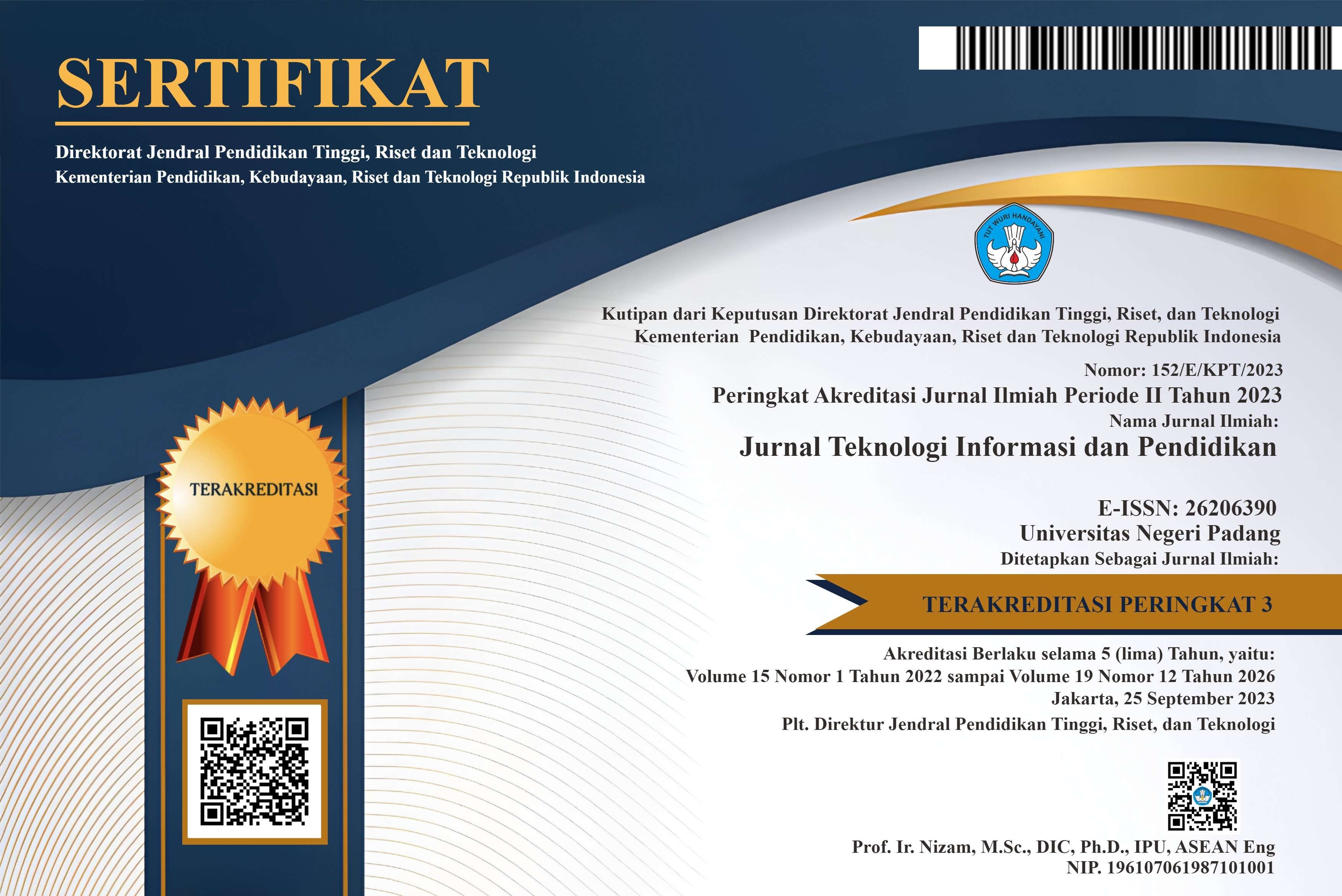Sentiment Analysis of 2024 Election Reviews In Twitter Using BERT with Emoticon Feature Extraction
DOI:
https://doi.org/10.24036/jtip.v18i2.993Keywords:
sentimen evaluation, emoticons, BERT, twitter, national electionAbstract
National elections are critical components of a functioning democracy, as they empower individuals to influence their nation's trajectory through active participation. In the contemporary digital landscape, social media platforms such as Twitter have emerged as pivotal forums for political discourse, enabling the expeditious dissemination of public sentiments. Nevertheless, assessing sentiment on Twitter poses various difficulties, primarily due to the casual nature of the language, the prevalent use of slang, sarcasm, and emoticons that often convey implicit emotional undertones. The present study puts forth a sentiment analysis framework that utilizes the Bidirectional Encoder Representations from Transformers (BERT) model, particularly IndoBERT, augmented with insights derived from emoticons. Emoticons are classified into three sentiment categories: positive, negative, and neutral. The dataset under consideration is composed of Indonesian tweets that have been pre-labeled and that pertain to the 2024 national election. Two configurations of the model were evaluated: a foundational IndoBERT model that relies solely on text, and an enhanced model that includes binary emoticon features. The experimental findings reveal that the emoticon-inclusive model attained a higher accuracy (78.5%) as opposed to the baseline model (77.7%) and demonstrated enhanced sensitivity in distinguishing neutral and negative sentiments. This finding suggests that emoticons offer valuable contextual information, thereby enhancing the accuracy of sentiment classification. The strategic integration of emoticons and BERT for Indonesian political sentiment analysis has received scant attention, rendering this method a novel addition to the field. The findings underscore the potential benefits of integrating text-based deep learning systems with emoticon characteristics to more effectively capture intricate emotional expressions in social media, particularly during political campaigns.
References
B. Prasetyo, Ahmad Yusuf Al-Majid, and Suharjito, “A Comparative Analysis of MultinomialNB, SVM, and BERT on Garuda Indonesia Twitter Sentiment,” PIKSEL : Penelitian Ilmu Komputer Sistem Embedded and Logic, vol. 12, no. 2, pp. 445–454, Sep. 2024, doi: 10.33558/piksel.v12i2.9966.
tanaja, rafael’ ’nicholas, “Evaluating Public Opinion on the 2024 Indonesian Presidential Election Candidate: An IndoBERT Approach to Twitter Sentiment Analysis”.
R. I. Yulfa, B. H. Setiawan, G. G. Lourensius, and K. Purwandari, “Enhancing Hate Speech Detection in Social Media Using IndoBERT Model: A Study of Sentiment Analysis during the 2024 Indonesia Presidential Election,” in 2023 International Conference on Computer and Applications (ICCA), IEEE, Nov. 2023, pp. 1–6. doi: 10.1109/ICCA59364.2023.10401700.
N. Khamidah, K. A. Notodiputro, and S. D. Oktarina, “Sentiment Analysis of Imbalanced Sarcastic Flood Disaster Texts Using Deep Learning Models,” International Research Journal of Innovations in Engineering and Technology, vol. 08, no. 11, pp. 150–158, 2024, doi: 10.47001/IRJIET/2024.811015.
M. F. Mubaraq and W. Maharani, “Sentiment Analysis on Twitter Social Media towards Climate Change on Indonesia Using IndoBERT Model,” JURNAL MEDIA INFORMATIKA BUDIDARMA, vol. 6, no. 4, p. 2426, Oct. 2022, doi: 10.30865/mib.v6i4.4570.
M. Z. Arifin, S. Y. Maulana, A. Noertjahyana, and A. Mohamed Asghaiyer, “Analyzing the Indonesian sentiment to rohingya refugees using IndoBERT model,” Bulletin of Social Informatics Theory and Application, vol. 8, no. 2, pp. 180–191, Dec. 2024, doi: 10.31763/businta.v8i2.749.
A. Roihan, T. T. Atmojo, R. A. Wardoyo, and M. S. T. Saputra, “Sentiment Analysis of Twitter Data on the 2024 Indonesian Presidential Election Using BERT,” CCIT Journal, vol. 18, no. 1, pp. 39–45, Oct. 2024, doi: 10.33050/ccit.v18i1.3210.
D. F. Putra and Y. Sibaroni, “Sentiment Analysis For The 2024 Presidential Election (Pilpres) Using BERT CNN,” Eduvest - Journal of Universal Studies, vol. 4, no. 11, pp. 11042–11056, Nov. 2024, doi: 10.59188/eduvest.v4i11.49961.
C. Yuan et al., “Target-based Sentiment Annotation in Chinese Financial News,” 2020. [Online]. Available: http://www.nbd.com.cn
D. Peskov, V. Hangya, J. Boyd-Graber, and A. Fraser, “Adapting Entities across Languages and Cultures.” [Online]. Available: https://go.umd.edu/adaptation
R. Wang et al., “Federated Domain Adaptation for Named Entity Recognition via Distilling with Heterogeneous Tag Sets.”
A. Noorian, A. Harounabadi, and M. Hazratifard, “A sequential neural recommendation system exploiting BERT and LSTM on social media posts,” Complex and Intelligent Systems, vol. 10, no. 1, pp. 721–744, Feb. 2024, doi: 10.1007/s40747-023-01191-4.
T. M. De Barros, H. Pedrini, and Z. Dias, “Leveraging emoji to improve sentiment classification of tweets,” in Proceedings of the ACM Symposium on Applied Computing, Association for Computing Machinery, Mar. 2021, pp. 845–852. doi: 10.1145/3412841.3441960.
S. Muspani, I. Made, A. D. Suarjaya, N. Kadek, and D. Rusjayanthi, “Sentiment Analysis Related to Korean Subculture in Indonesia Using BERT Method,” 2024. [Online]. Available: https://t.co/U1HmmS7dDA
Y. Zhou, L. Liao, Y. Gao, R. Wang, and H. Huang, “TopicBERT: A Topic-Enhanced Neural Language Model Fine-Tuned for Sentiment Classification,” IEEE Trans Neural Netw Learn Syst, vol. 34, no. 1, pp. 380–393, Jan. 2023, doi: 10.1109/TNNLS.2021.3094987.
K. Setyo Nugroho, A. Yullian Sukmadewa, H. D. Wuswilahaken, F. Abdurrachman Bachtiar, and N. Yudistira, “BERT Fine-Tuning for Sentiment Analysis on Indonesian Mobile Apps Reviews.” [Online]. Available: https://research.google/teams/brain.
S. Jangir, “Finetuning BERT and XLNet for Sentiment Analysis of Stock Market Tweets using Mixout and Dropout Regularization.”
H. Jayadianti, W. Kaswidjanti, A. T. Utomo, S. Saifullah, F. A. Dwiyanto, and R. Drezewski, “Sentiment analysis of Indonesian reviews using fine-tuning IndoBERT and R-CNN,” ILKOM Jurnal Ilmiah, vol. 14, no. 3, pp. 348–354, Dec. 2022, doi: 10.33096/ilkom.v14i3.1505.348-354.
Downloads
Published
How to Cite
Issue
Section
License
Copyright (c) 2025 Jurnal Teknologi Informasi dan Pendidikan

This work is licensed under a Creative Commons Attribution-ShareAlike 4.0 International License.















.png)














